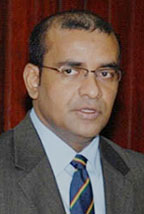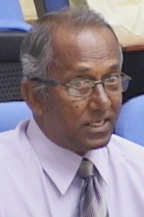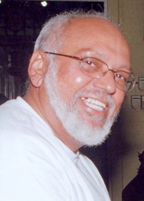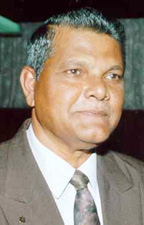Several men might run for the presidency in the general elections due in 2011
The race for the presidency is bringing out the serious and the devious in political parties and civil society alike. Neither of the two major political parties – People’s Progressive Party or People’s National Congress – has nominated its presidential candidate but several of their members have indicated their interest in running.
The Alliance for Change, after some internal turbulence, seems set to select its Chairman Khemraj Ramjattan as its candidate. The micro-parties – Guyana Action Party, Justice For All Party and The United Force – have been silent on the issue. A faceless ‘civic group’ which seems to pupate in the warm atmosphere of the election season has entered the fray. It lately published a proposal of principles which should form the basis for the nomination of its candidate.
All parties recognise the candidacy for the presidency is central to the campaign. This realisation is based on the prescription of Guyana’s peculiar Constitution that a presidential candidate will be deemed to be elected President “if more votes are cast in favour of the list in which he is designated as presidential candidate than in favour of any other list.”
To be successful, a party must be led by a very strong candidate who would require only a plurality, rather than a majority, of the votes cast. Governmental gridlock could eventuate if the person elected president is not supported by the majority of members in the National Assembly. To form an administration on its own, however, a political party must command a majority in the Assembly and win the Presidency as well. Should any party fail to win more than 50 per cent of the popular vote, it would be obliged to seek support from other parties to form a coalition administration. Parties might also be obliged to coalesce if, when combined, their votes comprise more than 50 per cent of the electorate.
President Bharrat Jagdeo is due to demit office in 2011 because the Constitution debars him from serving for a fresh term. He has repeatedly refuted rumours that he intended to seek a Constitutional amendment that would permit him to run for a third term. Racy reports have circulated that Mr Jagdeo reached an agreement with Mr Robert Corbin, leader of the People’s National Congress and leader of the Opposition in the National Assembly, to amend the Constitution so as to permit a third term.
Assurances were said to have been given that seven PNC members of the Assembly could be ‘persuaded’ to support a constitutional amendment to enable Mr Jagdeo to compete for re-election next year. It is claimed that if a Jagdeo-led PPP were to win, it would form a PPP-PNC coalition administration in which Mr Jagdeo would be President and Mr Corbin would be the Prime Minister. Both men have denied that any such agreement has been made.
The Stabroek News recently reported, however, that despite Mr Jagdeo’s repeated denial he intended to run again, a clandestine conclave of a ‘committee to re-elect the president’ – reminiscent of the shadowy CREEP of the 1980s – was convened at Freedom House, the PPP headquarters. The object was to devise the engineering of Mr Jagdeo’s re-election. PPP General Secretary Donald Ramotar was at pains to iterate the party’s commitment to honour the Constitution and to denounce moves started last year by a group calling itself the Guyanese Coalition For Jagdeo Third Term, to mobilise support for Mr Jagdeo’s re-election.
The PPP’s Jagdeoite ‘new guard’ faction, nevertheless, has made a case for their man to be re-elected. This, it is argued, will allow him to complete the management of several economic and environmental projects which he has not completed even after 11 years in office. Mr Jagdeo for his part, despite his meek denials, does not behave like a man about to demit office. He has heightened his profile as an international statesman as if to demonstrate that he cannot be replaced without harming the country’s development.
The Guyana Public Opinion Survey conducted earlier this year by the Barbados-based Caribbean Development Research Services Inc – CADRES – which was strongly skewed in favour of the AFC, can be a useful guide to potential presidential candidates. The Survey indicated that, on the basis of leadership qualities, the PPP’s Bharrat Jagdeo was the most popular. AFC’s Raphael Trotman, PNC’s Robert Corbin and Winston Murray and Joseph Singh – the ‘civic’ choice who was not supported by a party – followed. PPP’s Robert Persaud and AFC’s Khemraj Ramjattan came next. Given that Mr Corbin has publicly declared that he will not contest the presidency, and that Mr Trotman is likely to be replaced by Mr Ramjattan, there seem to be six strong contenders, including three from the PPP’s nomenklatura, remaining in the race.
Bharrat Jagdeo, 46, an executive member of the PPP, is suspected to be still interested in running. Educated as an economist in Moscow, he started his working life as a public servant in the State Planning Secretariat under the PNC administration in 1990. His first big break came when he was named Special Adviser to Minister of Finance Asgar Ally after the PPP entered office in October 1992. He was appointed Junior Minister of Finance the next year and replaced Ally as Senior Minister of Finance in 1995. His second break came after the retirement of former President Janet Jagan in 1999. He was appointed Prime Minister for a few hours and then President. He was elected President in 2001 and re-elected in September 2006.
Winston Murray, 69, is an executive member of the PNC who contested the party’s leadership unsuccessfully last year. He was educated as an economist and an attorney-at-law and entered the Public Service in the Ministry of Trade. An experienced administrator, he held several governmental posts – Second Secretary in Guyana’s Embassy in Brussels; Senior Economist and Deputy Secretary to the Treasury; Permanent Secretary in the Ministry of Trade and Industry; Head of the Department of International Economic Cooperation and Head of the International Secretariat. At the acme of his service, he was Senior Minister and Deputy Prime Minister in the Ministry of Trade, Tourism and Industry for seven years in the PNC Administration.
Robert Persaud, 36, is a PPP executive member who is very often in the news. He was trained as a reporter and started work at the Catholic Standard newspaper but later became a Senior Reporter and then Editor of the PPP’s Mirror newspaper. Until his appointment as Minister of Agriculture in September 2006, he was Information Liaison to the President and Head of the Government Information Agency where he was regarded as a member of the Jagdeoite ‘new guard.’ A former Chairman of the Progressive Youth Organisation and an elected member of the Party’s Central and Executive Committees, he also served as Director of the state-owned Guyana Broadcasting Corporation and Chairman of the National Communications Network.
Donald Ramotar, 60, the bastion of the Jaganite ‘old guard,’ joined the PPP in 1966 and was elected to its Central Committee in 1976 and to its Executive Committee in 1983. He served on the Editorial Council of the World Marxist Review journal in Prague, Czechoslovakia and as the Guyana Agricultural and General Workers’ Union’s International Secretary. The Party’s most faithful apparatchik, he served as manager of Freedom House and was elected General Secretary and member of the Central and Executive Committees. He was also elected to the editorial board of the PPP journal – Thunder.
Khemraj Ramjattan, 50, Chairman of the AFC, is a former PPP stalwart, serving as Chairman of the Progressive Youth Organization and as a member of the Central Committee. He has also been a Member of the National Assembly from October 1992. After an internal party clash with Mr Jagdeo, he was expelled from the PPP in February 2004. He then helped, together with Raphael Trotman who left the PNC and Sheila Holder who left the Working People’s Alliance, to establish the composite Alliance for Change. He was educated as an attorney-at-law and served as a former State Counsel in the Chambers of the Director of Public Prosecutions and is a former President of the Guyana Bar Association.
Joseph Singh, 65, although recognisable in the press, has the least experience in mass politics of all the candidates. He has never been identified as a member of a political party and has made no statement that would indicate what his political beliefs are or where his loyalties lie. Nor has he been identified with a significant constituency of the electorate.
He was trained as a military officer and served as Director General of the Guyana National Service and Chief of Staff of the Guyana Defence Force. He was appointed, after retiring from the Defence Force, as Chairman of the Guyana Elections Commission, Executive Director of Conservation International (Guyana) and Chief Executive Officer and General Manager of the Guyana Telephone and Telegraph Company.
These are the six men most likely to be running for the presidency. The field is open to other candidates several of whom have expressed their interest. From the PPP alone, ‘old guarders’ Hari Narayen ‘Ralph’ Ramkarran, Moses Nagamootoo and Clement Rohee might be contestants. From the micro-parties, Paul Hardy of the Guyana Action Party, Cheddi ‘Joey’ Jagan of the Unity Party, Manzoor Nadir of The United Force, Peter Ramsaroop of Vision Guyana and Chandra Narine Sharma of the Justice For All Party might declare their candidacy. Their weak public support, however, is unlikely to enable them to influence the outcome of the presidential contest.
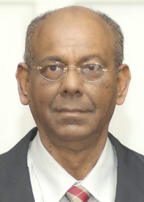
The road to the presidency, for those who enter the enervating electoral campaign, will be fraught with obstacles. One of the biggest will be the ethnic problem. Guyana’s electoral politics reflects the country’s racial affiliations and all the major parties rely on the core support of one or other ethnic group.
The PPP is supported by Indians and the PNC and AFC by Africans. Nearly 20 per cent of the population describe themselves as ‘mixed’ and about 10 per cent as Amerindian. Owing to migration and miscegenation, the African and Indian sections might be near-equal in number by 2011. The contest for ‘cross-over’ voters will likely be more intense than in previous years. Both major parties – PPP and PNC – need to maintain their core ethnic support while attracting at least a substantial percentage of the remaining population to win an outright majority.
The respective presidential candidates, if they hope to win, must be able to appeal both to their core supporters and to voters from other groups. The coming campaign promises unanticipated outcomes.

